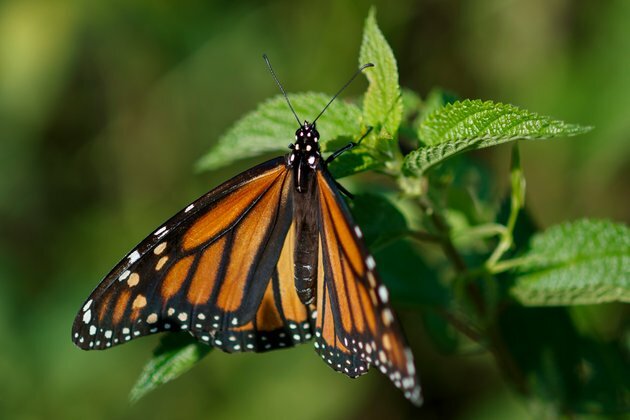Endangered-Species Decision Expected on Beloved Butterfly
Voice of America
14 Dec 2020, 18:05 GMT+10

Trump administration officials are expected to say this week whether the monarch butterfly, a colorful and familiar backyard visitor now caught in a global extinction crisis, should receive federal designation as a threatened species.
Stepped-up use of farm herbicides, climate change and destruction of milkweed plants on which they depend have caused a massive decline of the orange-and-black butterflies, which long have flitted over meadows, gardens and wetlands across the U.S.
The drop-off that started in the mid-1990s has spurred a preservation campaign involving schoolchildren, homeowners and landowners, conservation groups, governments and businesses.
Some contend those efforts are enough to save the monarch without federal regulation. But environmental groups say protection under the Endangered Species Act is essential - particularly for populations in the West, where last year fewer than 30,000 remained of the millions that spent winters in California's coastal groves during the 1980s.
This year's count, though not yet official, is expected to show only about 2,000 there, said Sarina Jepsen, director of the endangered species program at the Xerces Society conservation group.
"We may be witnessing the collapse of the of the monarch population in the West," Jepsen said.
Scientists separately estimate up to an 80% monarch decline since the mid-1990s in the eastern U.S., although numbers there have shown a recent uptick.

The Trump administration has rolled back protections for endangered and threatened species in its push for deregulation, even as the United Nations says 1 million species - one of every eight on Earth - face extinction because of climate change, development and other human causes.
Under a court agreement, the U.S. Fish and Wildlife Service must respond by Tuesday to a 2014 petition from conservation groups on behalf of the monarch.
The agency could propose or decline to list the butterfly as threatened, which means likely to become in danger of extinction within the foreseeable future throughout all or much of its range. Or it could find that a such listing is deserved but other species have a higher priority, which might delay action indefinitely.
A recommendation to designate the butterfly as threatened would be followed by a yearlong period to take public comment and reach a final decision.
Listing it "would guarantee that the monarch would get a comprehensive recovery plan and ongoing funding," said Tierra Curry, a senior scientist with the Center for Biological Diversity. "The monarch is so threatened that this is the only prudent thing to do."
If the status is granted, federal agencies would have to consult with the Fish and Wildlife Service about potential harm to monarchs from actions proposed for government funding or permitting, such as expanding interstate highways. The service would prescribe other measures in a regulation tailored specifically for the butterfly.
Orley "Chip" Taylor, an insect ecologist at the University of Kansas, agreed the butterfly's long-term prognosis is grim but said he opposes a federal listing for now, fearing it would sour many rural residents on helping the monarch.
"There's a palpable fear of regulation out there," he said, adding that voluntary measures should be given additional time.
Monarchs in southern Canada and the eastern U.S. migrate by the millions to mountainous areas of Mexico each winter, while those west of the continental divide head to coastal California. They congregate so thickly in forests that scientists can estimate their numbers through aerial inspections of trees with an orange hue.
Worsening droughts are reducing the number that survive the journey south for winter, Taylor said, while rising temperatures prompt the butterflies to leave their wintering grounds too soon, damaging reproduction. As the forests dry out, wildfire risk worsens.
If habitat losses and climate change aren't slowed, "we aren't going to have a monarch migration in 30 years," Taylor said.
Environmental groups say 67 million hectares of monarch habitat - an area the size of Texas - have been lost in the past 20 years to development or herbicide applications in cropland.
Twenty-five years ago, the 6-year-old son of a chemist named Jim Edward just happened to catch a monarch tagged by Oberhauser's researchers, when the butterfly wandered into Edward's yard in Minnesota.
Since then, captivated by the butterfly and its complex migration over generations, Edward has raised monarchs to tell and show hundreds of school groups about the unending migrations.
"Just the exposure of kids to that, that don't necessarily get to see" wildlife otherwise, he said. "Their enthusiasm, their joy, their 'oh, wowness' - to see that."
Some enthusiasts fear they could no longer harvest eggs and raise monarchs if the species gains federal protections. Curry said her group has recommended that careful, small-scale, noncommercial raising be allowed.
Sheila Naylor, a substitute teacher near Sedalia, Mo., says the chance discovery of a milkweed plant in her yard five years ago inspired a quest to grow the monarch's host plant in every available inch of yard and roadside.
She visits the Missouri state fair, schools and elder care homes, pleading the case for preserving monarch and other native butterflies.
"I push myself," Naylor said, "because the butterflies keep me going."
 Share
Share
 Tweet
Tweet
 Share
Share
 Flip
Flip
 Email
Email
Watch latest videos
Subscribe and Follow
Get a daily dose of Hong Kong Herald news through our daily email, its complimentary and keeps you fully up to date with world and business news as well.
News RELEASES
Publish news of your business, community or sports group, personnel appointments, major event and more by submitting a news release to Hong Kong Herald.
More InformationChina
SectionDalai Lama to address Buddhist conference, reveal succession plan
DHARAMSHALA, India: The Dalai Lama is set to address a significant three-day conference of Buddhist leaders this week, coinciding with...
Beijing crowds cheer AI-powered robots over real soccer players
BEIJING, China: China's national soccer team may struggle to stir excitement, but its humanoid robots are drawing cheers — and not...
COVID-19 source still unknown, says WHO panel
]LONDON, U.K.: A World Health Organization (WHO) expert group investigating the origins of the COVID-19 pandemic released its final...
China: Building a 'Patriots Only' Hong Kong
(New York) - China's government has erased Hong Kong's freedoms since imposing the draconian National Security Law on June 30, 2020,...
"All his devotees desire to see him healthy": Kiren Rijiju attends Dalai Lama's birthday eve celebrations in Dharamshala
Dharamshala (Himachal Pradesh) [India], July 5 (ANI): As Tibetans around the world prepare to celebrate the 90th birthday of the 14th...
Hainan emerges as China's premier international medical tourism destination
HAIKOU, July 5 (Xinhua) -- Nestled in the coastal town of Boao in south China's Hainan Province, the Boao Lecheng International Medical...
Business
SectionEngine defect prompts Nissan to recall over 443,000 vehicles
FRANKLIN, Tennessee: Hundreds of thousands of Nissan and Infiniti vehicles are being recalled across the United States due to a potential...
Microsoft trims jobs to manage soaring AI infrastructure costs
REDMOND, Washington: Microsoft is the latest tech giant to announce significant job cuts, as the financial strain of building next-generation...
Stocks worldwide struggle to make ground Friday with Wall Street closed
LONDON UK - U.S. stock markets were closed on Friday for Independence Day. Global Forex Markets Wrap Up Friday with Greeback Comeback...
Nvidia briefly tops Apple’s record in AI-fueled stock rally
SANTA CLARA, California: Nvidia came within a whisker of making financial history on July 3, briefly surpassing Apple's all-time market...
ICE raids leave crops rotting in California, farmers fear collapse
SACRAMENTO, California: California's multibillion-dollar farms are facing a growing crisis—not from drought or pests, but from a sudden...
Trump signals progress on India Trade, criticizes Japan stance
WASHINGTON, D.C.: President Donald Trump says the United States could soon reach a trade deal with India. He believes this deal would...













